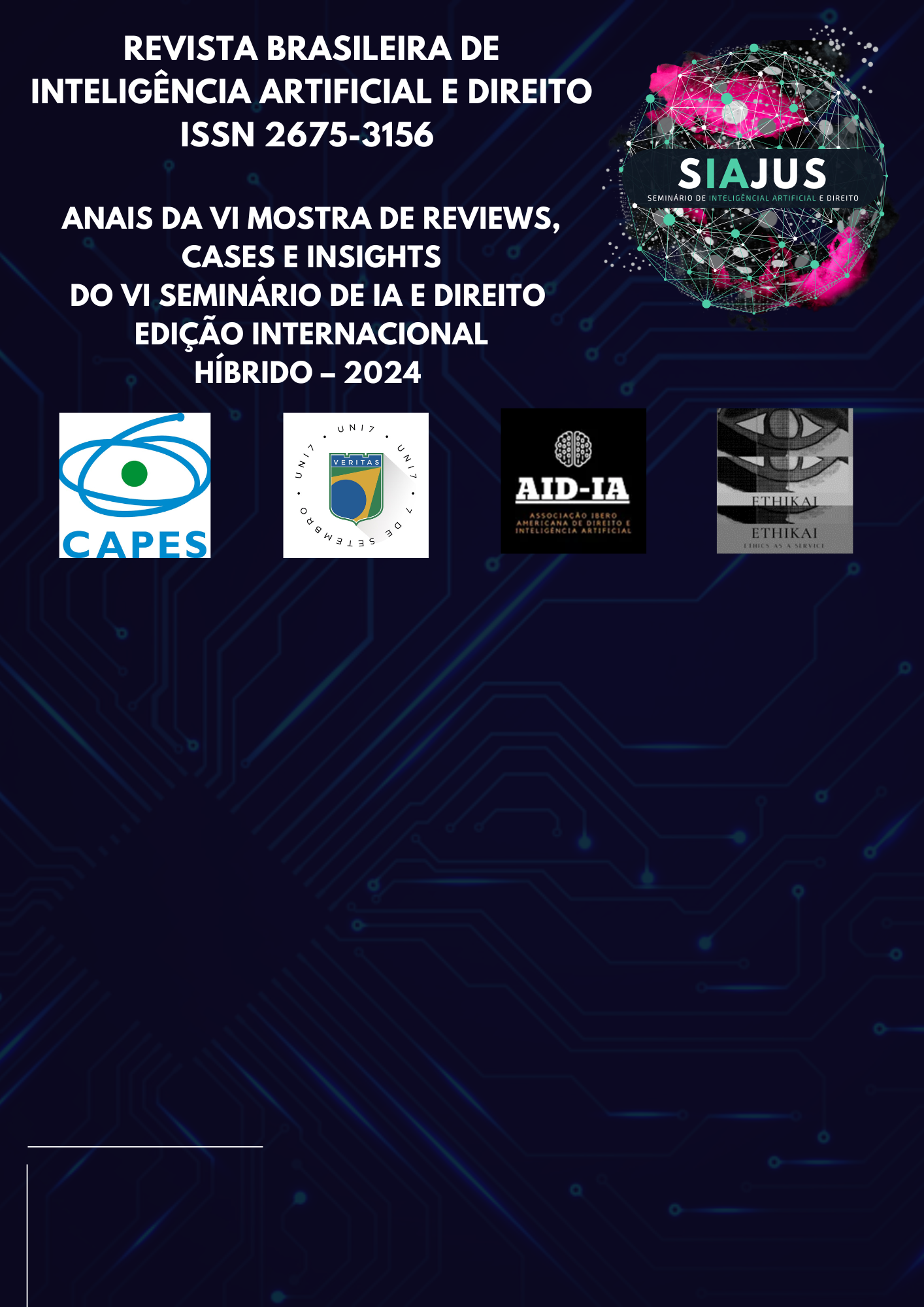HOW OUR PARENTS
the use of artificial intelligence in the light of succession law in the case of Elis Regina
Keywords:
Artificial Inteligence, co-regulation, Right to Image, Succession, Digital HeritageAbstract
This research addresses artificial intelligence and the use of posthumous image rights. It focuses on a case involving the use of deepfake technology to recreate the singer Elis Regina, who passed away 41 years ago, for a Volkswagen 70th anniversary campaign, where she was digitally placed alongside her daughter, the singer Maria Rita. The study aims to investigate how to establish limits on the use of artificial intelligence in relation to posthumous image rights. It involves analyzing the regulation of artificial intelligence in Brazil, exploring the right to the image of deceased individuals, and examining the Elis Regina case in terms of personality rights within the context of artificial intelligence. To achieve its objectives, the research methodology employed was deductive, involving a literature review of doctrines and laws related to artificial intelligence, personality rights, succession rights, and digital rights. The work concludes that human dignity, as a fundamental right, transcends death and technological revolutions but raises questions about the use of artificial intelligence, especially concerning deceased individuals, leading to debates on ethical considerations and authorial rights in the context of AI
References
CNN BRASIL. Conar abre representação ética contra propaganda da Volkswagen com Elis Regina. CNN Brasil, São Paulo, 10 jul. 2023. Disponível em: https://www.cnnbrasil.com.br/nacional/conar-abre-representacao-etica-contra-propaganda-da-volkswagen-com-elis-regina/. Acesso em: 20 jul. 2024.
CONAR ARQUIVA PROCESSO CONTRA VOLKS POR COMERCIAL COM ELIS REGINA. Migalhas, 24 ago. 2023. Disponível em: https://www.migalhas.com.br/quentes/392385/conar-arquiva-processo-contra-volks-por-comercial-com-elis-regina. Acesso em: 20 jul. 2024.
DE SOUZA, Allan Rocha. Direitos autorais e as obras audiovisuais: entre a proteção e o acesso. In: SCHREIBER, Anderson (coord.). Direito e Mídia. São Paulo: Atlas, 2013.
ELIS REGINA E MARIA RITA JUNTAS NO COMERCIAL DA VOLKSWAGEN!. YouTube, 2024. Disponível em:< https://www.youtube.com/watch?v=pjmrqKc0pvo>. Acesso em: 20 jul. 2024.
ELIS REGINA RECRIADA POR IA MOTIVA PROJETO PARA USO DE IMAGEM DE PESSOAS MORTAS. Senado Notícias, Brasília, DF, 20 jul. 2023. Disponível em: https://www12.senado.leg.br/noticias/materias/2023/07/20/elis-regina-recriada-por-ia-motiva-projeto-para-uso-de-imagem-de-pessoas-mortas. Acesso em: 20 jul. 2024.
FIGUEIRA, Hector Luiz Martins; RENZETTI FILHO, Rogério Nascimento; DE LUCA, Guilherme Domingos. Herança digital e o caso Elis Regina: implicações jurídicas no uso da imagem de pessoas mortas pela inteligência artificial. Revista Jurídica, Curitiba, v. 3, n. 75, p. 527-545, 2023.
GLOBO COMUNICAÇÃO E PARTICIPAÇÕES S.A. Fato ou Fake - Coronavírus. G1. Disponível em: https://g1.globo.com/fato-ou-fake/coronavirus/. Acesso em: 20 jul. 2024.
HOFFMANN-RIEM, Wolfgang. Big data e inteligência artificial: Desafios para o Direito. REI-REVISTA ESTUDOS INSTITUCIONAIS, v. 6, n. 2, p. 431-506, 2020.
Instituto Brasileiro de Direito de Família (IBDFAM). Boletim Informativo do IBDFAM, n. 33, jun./jul. 2017. Disponível em: https://ibdfam.org.br/noticias/6536/Boletim+Informativo+do+IBDFAM+-+Retrospectiva+2017 . Acesso em: 20 jun. 2024.
JUNIOR, Vitor de Azevedo Almeida. A imagem fora de contexto: o uso de imagens de arquivo. In: SCHREIBER, Anderson (coord.). Direito e Mídia. São Paulo: Atlas, 2013.
LUCENA, André. Comercial que 'revive' Elis Regina reabre debates sobre a colaboração da VW com a ditadura. Carta Capital, 4 jul. 2023. Disponível em: <https://www.cartacapital.com.br/sociedade/comercial-da-vw-traz-de-volta-elis-e-belchior-mas-reabre-debate-sobre-colaboracao-com-a-ditadura/>. Acesso em: 20 jul. 2024.
MCCARTHY, John. What is artificial intelligence?. Computer Science Department, Stanford University, 2007. Disponível em: <http://www-formal.stanford.edu/jmc/whatisai/whatisai.html>. Acesso em: 20 jul. 2024.
RIBEIRO MAGRO, Americo; ANDRADE, Landolfo. "DEEPFAKES": IMPLICAÇÕES JURÍDICAS DAS MANIPULAÇÕES MULTIMÍDIA AO DIREITO DE IMAGEM. Meu site jurídico, 30 set. 2020. Disponível em:<https://meusitejuridico.editorajuspodivm.com.br/2020/09/30/deepfakes-implicacoes-juridicas-das-manipulacoes-multimidia-ao-direito-de-imagem/#_ftn3>. Acesso em: 20 jul. 2024.
SUZUKI, Shin. O grupo brasileiro de ódio a mulheres que fabrica com IA imagens pornô falsas sob encomenda. G1, 18 jul. 2024. Disponível em: https://g1.globo.com/tecnologia/noticia/2024/07/18/o-grupo-brasileiro-de-odio-a-mulheres-que-fabrica-com-ia-imagens-porno-falsas-sob-encomenda.ghtml. Acesso em: 20 jul. 2024.
TARTUCE, Flávio. Herança digital e sucessão legítima: primeiras reflexões. Migalhas. v. 20, 2018.
TEPEDINO, Gustavo. Fundamentos do direito civil: teoria geral do direito civil. 5. ed. Rio de Janeiro: Forense, 2024.
TRIBUNAL SUPERIOR ELEITORAL (Brasil). TSE proíbe uso de inteligência artificial para criar e propagar conteúdos falsos nas eleições. Brasília, DF, 28 fev. 2024. Disponível em: https://www.tse.jus.br/comunicacao/noticias/2024/Fevereiro/tse-proibe-uso-de-inteligencia-artificial-para-criar-e-propagar-conteudos-falsos-nas-eleicoes. Acesso em: 20 jul. 2024.


